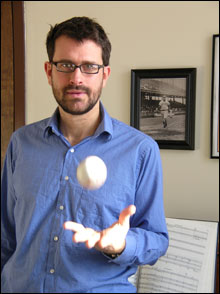
ON THE BALL USM: composer Daniel Sonenberg. |
In his third year as resident composer and professor at the University of Southern Maine, Daniel Sonenberg is making his mark in the field. An advocate for contemporary art music, he encourages artists to “buck categorical limits,” to overcome stylistic boundaries. There are “more areas of crossover than people realize.” Starting as rock drummer and singer-songwriter, then composing opera and chamber music, he leads by example.
The man who scored a piece with “very blatant rock overtones,” Mejdoub (1998) for accordion, clarinet, drums, electric guitar, and piano, and who takes the stage as the drummer for folk-country-pop band Truth About Daisies, will be featured in an all-Sonenberg recital at Corthell Hall this Friday. Musicians from both here and “from away” comprise a performers’ roster of thirty.
“We have so much to learn from each other,” says Sonenberg. “The people I’m bringing up from New York are very excited to see what we’re doing here in Maine. Mixing it up with inside and outside blood is really important.”
Notable locals — Portland Symphony Orchestra bassoonist Ardith Keef and violinist Robert Lehmann begin the recital with “Noë Noë,” from Sonenberg’s Quintet for Bassoon and String Quartet — a wonderful aural journey of a melody, a Renaissance tune from a mass by Jacob Arcadelt, itself borrowed from Jean Mouton’s motet. The melody starts dramatically in strings, with bassoon embellishment. The strings develop fragments of melody while dissecting it rhythmically. The bassoon doubles its role, helping the cello move the bass line and rhythm forward as melody is abstracted. The strings, hard-pressed to let go of the melody, after much tempting by the bassoon’s fragment variations, finally let the cello have it in, well, bass-ics. From there the bassoon solos a free melody with string embellishment, reassembles it and handily returns it in one piece to the strings. In its favored role as the melody and bass’s go-between, the bassoon joins the quartet in a tonally expanding escort of the melody to its final ending statement. This is exciting instrumental music!
Next — vocal works performed by USM professor, tenor, and composer Bruce Fithian — are three selections from Sonenberg’s 1999 Baseball Songs. The first two, “Prayer for the Captain” and “Imagine,” are joined, set to text spoken by famous broadcaster Phil Rizzuto. In “Prayer,” Rizzuto comments on Thurman Munson’s tragic 1979 death in a solo plane crash. “You know they say time heals all wounds, and I don’t quite agree with that a hundred percent — it gets you to cope with wounds. You carry them the rest of your life.”
In “Imagine,” Sonenberg captures Rizzuto’s narration of the suspenseful, thrilling 1978 one-game playoff between the Red Sox and the Yankees. “Imagine two teams coming down to the end of the season, both winning 99 games. Everybody thought 95 would win the pennant, and it all comes down to this one game of play.”
The third, “Old (G)love” is set to a poem by Royals pitcher Dan Quisenberry. He holds his old glove nostalgically: “Now you look so small. You shrink like old men, stiff and less flexible, but you still look nice and holding you feels so right.” Quisenberry died of a brain tumor, which is relevant shortly.
“From away” flutist Lisa Lutton and harpist Arielle perform their second and third performances respectively of Whistlesparks (2006), featuring advanced techniques — flute whistletones and harp harmonics. The “sparks” represent syncopated rhythms. Fluid Claude Debussy-piano-like harp lines and dirty, gritty flute sounds pleasantly contrast clean and raw aesthetics.
For Sonenberg, the internalization of Whistlesparks into these performers’ repertoires is flattering. “It’s wonderful to hear a performer play your piece several times and hear how it grows and develops. Too often new compositions are only played once and then set aside.”
Completing the program’s first half are selections from The Art of Eating — exploring historical connections between food and gender roles, with texts by women writers. USM professor and soprano Ellen Chickering performs them, bringing expertise as owner-operator of two restaurants. “Midwest Albas” is set to a nostalgic ode to Midwestern cafeterias by Collette Inez. “Les Amantes” (the Lovers) is a “passionate, sensual, racy kind of song” set to Carla Drysdale’s poem. “Scrambled Eggs,” with text by M.F.K. Fischer, is “a recipe for the worst possible scrambled eggs that you could make.”
As singer-songwriter, writing lyrics was the part Sonenberg liked least, but he enjoys setting music to others’ words. “It allows you to inhabit someone else’s writing in a deep, personal way and make it your own. It’s the ultimate act of interpretation — putting meaning into something that can be interpreted different ways. It’s a collaboration — sometimes with somebody who’s not even there.”
The Summer King, Sonenberg’s opera about Negro League baseball player Josh Gibson (legendarily the only one to ever hit a ball completely out of Yankee Stadium), originated as a collaboration with librettist Daniel Nester in 2003, as part of the American Opera Projects’ “Composer and the Voice” series. New Yorker Steven Osgood conducts this performance, sung by a group of New York vocalists.